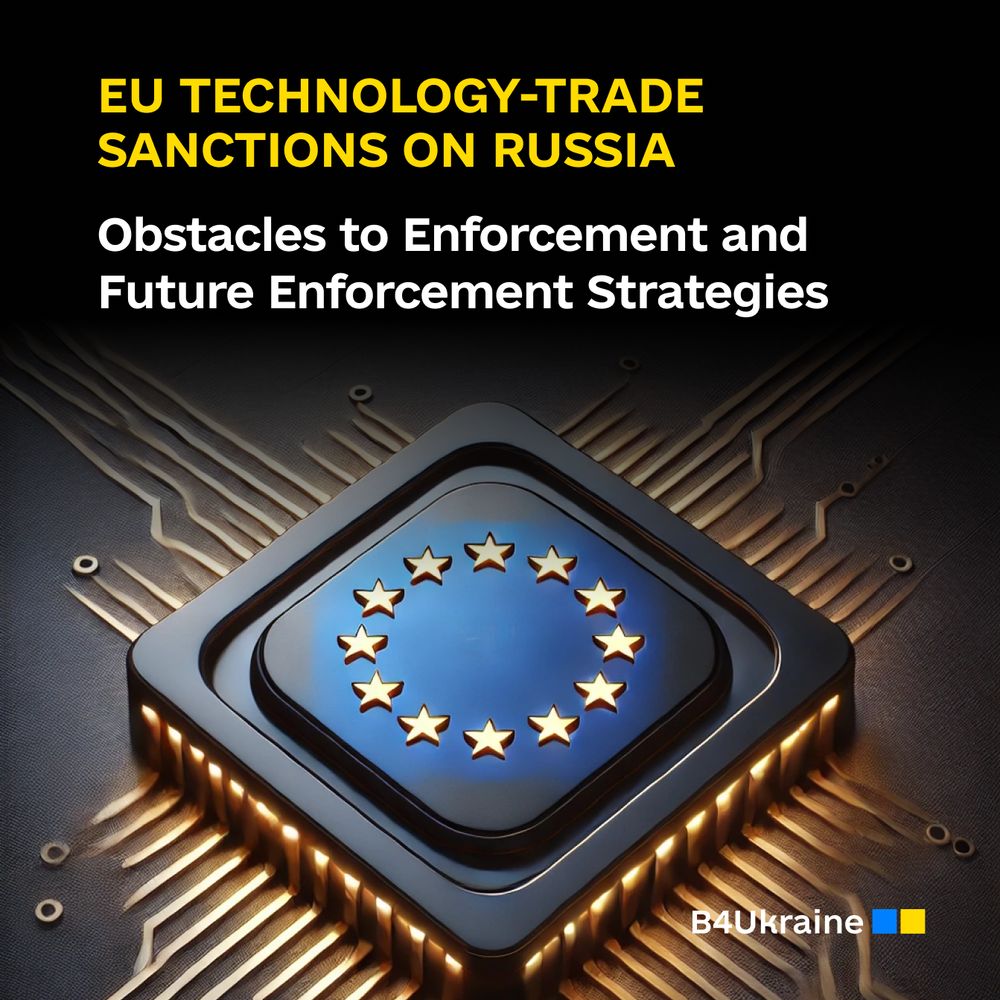
A new B4Ukraine report exposes major obstacles to enforcing EU tech-trade sanctions on Russia — from legal loopholes to lack of due diligence — and lays out urgent strategies for fixing them.
EXECUTIVE SUMMARY
• Enforcement of European technology-trade sanctions on Russia is seriously underpowered. There have been over 2000 sanctions investigations reportedly announced by civil and criminal enforcement agencies in the European Union (EU), UK and Switzerland since the full-scale invasion of Ukraine in February 2022, but only a handful of successful prosecutions in each country. Across Europe as a whole, recent journalistic analysis found that there have only been 8 custodial sentences for Russia-related sanction crimes since 2022. In German states where figures are available, over two-thirds of cases have already been closed without any action. In the UK, which by April 2024 had launched over 250 investigations of sanctions violations (of all kinds), there have been just six fines for Russian trade sanctions violations – five of them for an average of just £73,000 (EUR 88,000) – and no criminal prosecutions at all.
• Aspects of EU sanctions and export control law itself are challenges to enforcement of technology trade sanctions. While limited investigative and prosecutorial resources and capacity may be contributing to low levels of enforcement, discussions and public statements from investigators and prosecutors indicate obstacles in EU sanctions and export control law itself: particularly very high thresholds and requirements of knowledge to trigger export licensing requirements in some cases, and liability for violations of export controls in others. In the EU, knowledge thresholds are higher, and due-diligence requirements much lower, than in other allied jurisdictions, particularly the USA. In Switzerland, a key ‘catch-all’ which provides a knowledge-based backstop to prevent unlisted goods being exported for weapons production in embargoed destinations like Russia, does not exist in Swiss dual-use export controls at all.
• EU exporters can and have avoided knowledge of the military end-use of their sensitive exports to Russia. This report outlines anonymized cases investigated via open sources in which EU exporters:
Have shipped export-controlled machinery to third-party intermediaries in Turkey listed as non-controlled goods categories on export documentation, which were then shipped on – under controlled goods categories – to a company in Russia which is fully owned by the original EU exporter;
Have supplied satellite antennae and positioning modules to a Russian electronics distributor with which the EU exporter has collaborated for two decades, and with which it previously co-owned a Russian company. Despite the EU exporter being informed in 2019 that its products, exported to this Russian distributor for ostensible civilian use, had been recovered on multiple occasions from Russian military UAVs downed in Ukraine and during EU airspace incursions, the EU exporter continued to ship products to the Russian distributor for another two years.
Have continued to supply specialized navigation components to a Russian distributor after it provided the EU exporter with lists of end-users that included Russia’s leading producer of armed medium-range UAVs.
Have supplied CNC machine tools to a leading procurer of machine tools for Russian military industry from after the imposition of an EU arms embargo in 2014 until July 2022 – despite that Russian partner company only contracting in publicly available procurement records to supply the EU exporter’s machine tools to EU-sanctioned Russian weapons producers.
Though these activities may have involved unlawful acts, and merit further investigation, legal reviews suggest that in many cases these and other EU exporters could have avoided triggering knowledge-based reporting or licensing obligations under EU law – despite public information being readily available about their Russian customers’ military procurement activity, and decades of close collaboration or even co-ownership with these Russian customers.
• Three legislative changes to the EU’s core technology trade control laws, and their counterparts in UK and Swiss law, could bring such activities within the scope of export controls and generate prosecutable liability for sanctions violations:
Exporter knowledge: Reduce the knowledge threshold that triggers export licensing requirements in the military end-use catch-all clause for embargoed destinations (Article 4 of Regulation 821/2021), from “is aware…are intended, in their entirety or part” to “is aware, or has reasonable cause to suspect…may be intended, in their entirety or part.”
Due-diligence: Introduce mandatory due-diligence requirements on exporters of all goods listed in the EU Dual-Use List, Annex VII of Regulation 833/2021 and Annex XXIII of Regulation 833/2021. Harmonise these due-diligence requirements with those in Supplement No. 3 to Part 732 of the US Export Administration Regulations, to include a list of key documentation/information that all exporters must obtain from customers, and a list of red-flag checks that exporters must check. As with the US Export Administration Regulations, inability to ‘clear’ these red-flag checks should trigger a notification/licensing requirement to Member State export licensing authorities.
Trade control coverage of key sectors: Also apply these mandatory due-diligence requirements to exporters of all goods in certain key sectors useful for military production, including machine tools and related components and consumables of all kinds, so that suspicious transactions in these sectors trigger the notification/export licensing requirements in the EU’s military-end-use catch-all clause.
• As shown by the examples in this paper, these three changes would bring EU technology trade controls in line with countries outside the EU. Nor are they entirely new within the EU: versions of them were proposed by the European Commission in 2016. With EU exports to Russian military industry now a key European security threat, it is past time to revisit these reforms.